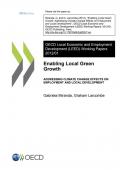Using a computable general equilibrium, this paper quantifies the GDP and employment effects of an illustrative greenhouse gas emissions reduction policy. The paper first analyses the direct negative economic effects of the emissions restrictions on GDP and examines labour sectoral reallocations in a framework where labour markets are perfectly flexible. The model is then modified to incorporate labour market imperfections in OECD countries that could generate unemployment, namely, short-run rigidities in real wage adjustment. It is shown that imperfect wage adjustment increases the cost of mitigation policy since unemployment increases in the short-run, but that the carbon tax revenue generated can be recycled so as offset some or all of this effect, notably when it is used to reduce wage-taxes. Thus, taking realistic labour market imperfections into account in a CGE model affects the GDP costs of mitigation policy in two ways: first by introducing extra costs due to the increased unemployment that such policy may entail; second by creating the possibility of a double dividend effect when carbon taxes are recycled so as to reduce distorting taxes on labour income.
Long-term projections suggest that without policy changes, the continuation of business-as-usual economic growth and development will have serious impacts on natural resources and the ecosystem services on which human well-being depends. This highlights the necessity for both developed and developing countries to move to a new growth path that is consistent with the protection of the environment and a sustainable use of scarce natural resources, while still achieving sizeable gains in living standards and reducing poverty...

Technological innovation can lower the cost of achieving environmental objectives, so it is important to understand how environmental policy design and technological innovation are linked. This is particularly true in the area of climate change where the estimated future costs of reducing greenhouse gas emissions are affected greatly by the technological trajectory of the economy. While we suspect that public policy can play an important role in accelerating the development and diffusion of climate change mitigation and adaptation technologies, empirical evidence in this area remains scant. This book presents a series of papers that explore the extent to which technological innovation can lower the cost of achieving climate change mitigation objectives.
This publication presents examples of the application of technical expertise, of workplace participation, and of tools that promote workers’ health and safety to problems that extend beyond the workplace into areas such as environmental protection, public health and the accountability of employers. It focuses on crucial issues ranging from climate change and energy, chemicals management, and corporate social responsibility and accountability to future involvement of workers and trade unions with the environment and with efforts to move towards sustainability.
